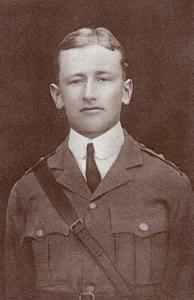
|

|
| Lieutenant Benbow William Richard REYNOLDS | |
|
103rd Maharatta Light Infantry Indian Army Date of birth: 17th April 1892 Date of death: 20th July 1916 Died aged 24 Buried at Baghdad (North Gate) War Cemetery Plot XXI Row S Grave 1 |

|
| Benbow William Richard Reynolds was born on the 17th of April 1892 the son of William Benbow Reynolds, a Locomotive Superintendent for the Indian Railways, and Margaret Elizabeth (nee Bliss) Reynolds of 56 Woodstock Road, Finchley in London NW4. He was educated at Lancing College where he was in Olds House from January 1906 to July 1910. He was a Sergeant in the Officer Training Corps, a member of the Shooting VIII in 1910 and was appointed as a Prefect the same year. On leaving school he went on to the Royal Military College Sandhurst where he passed out 4th and was commissioned as a 2nd Lieutenant on the Unattached List of the Indian Army in September 1911. He was attached to the 1st Battalion Royal Sussex Regiment in 1912. On the 9th of December 1912 he was promoted to Double Company Officer in the the 103rd Maharatta Light Infantry, Bombay Presidency and was promoted to Lieutenant on the 3rd of December 1914. He was on active service from November 1914 when he went to the Persian Gulf and was frequently called upon for service with General Townsend's staff. He was captured, along with the rest of the garrison, when the besieged city of Kut surrendered to the Turks on the 29th of April 1916. He was marched to Kastamouni where he was interned and died of fever. Colonel Garrett wrote:- "His death is a blow to everyone in the regiment; he was everything one desired, and such a good and promising officer too in his work and character from the very first." Colonel Ross wrote:- "No one thought more of him than his Commanding Officer, Colonel Brown, who had earmarked him for his next Adjutant, in fact he was doing Adjutant's work at the time of his capture, I believe. He is a real loss to us-such a bright, cheerful young officer, and always ready for any amount of work. It is so sad that he should have died as he has, after passing through all that terrible siege." He was mentioned in dispatches three times, one of which was Sir P. Lake's despatches regarding the defence of Kut, and was unsuccessfully recommended for the Distinguished Service Order by General Townsend. He is commemorated on the war memorial at the Royal Military College Sandhurst. |
|
| Olds House |
Back